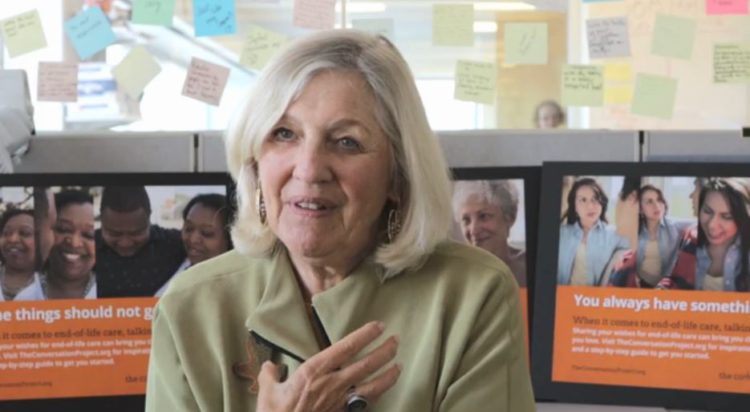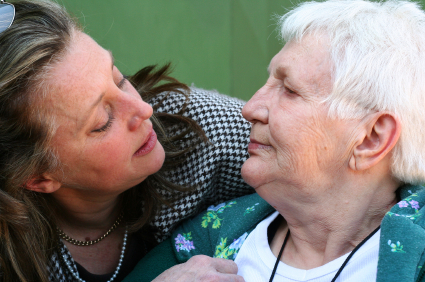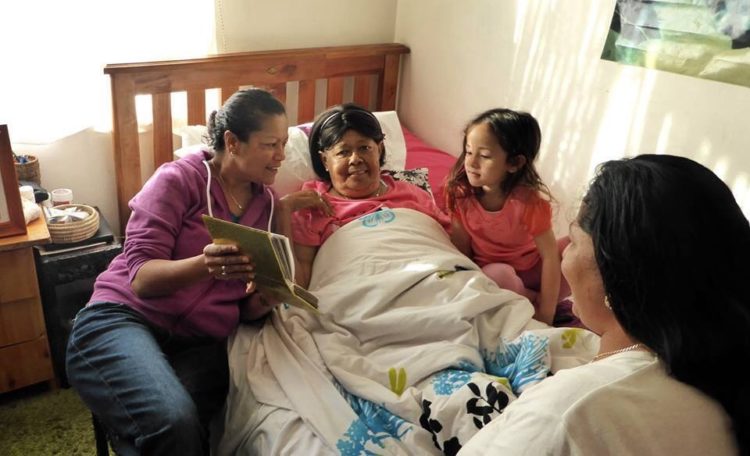In the new heart-warming Indie film, “Other People, “ we watch a close-knit family gather around their dying mother in her last year of life.
The film captures the discomfort and awkwardness with which most American family’s deal with death and dying. There is a powerful hospital scene where the mother screams, after vomiting into a metal pan, that she can’t take any more chemo because it’s making her violently ill. Her husband and three young adult children are awkward observers, mute because they don’t know what to say.
I found myself wishing the family had been able to comfort their mother, telling her they were OK with her decision, even encouraging her to talk about how she would like to live out her remaining time. But this conversation didn’t occur. It rarely does in American families.

Ellen Goodman discussing “The Conversation Project”
Ellen Goodman, the former Boston Globe columnist, has embarked on a mission called “The Conversation Project” to address our national resistance to discussing death and dying with our loved ones. She refers to this as “the most important national conversation we’re not having.”
She insists that we have this conversation before there is a health care crisis. Because the very idea of such a conversation can invoke fear and trembling in most of us, Goodman has developed a Conversation Starter Kit to ease the way.
The kit starts off with “ice breakers” for addressing elderly family members or for talking to your adult children about your preferences at the end of life. For example when discussing your own death,the suggestion is along the lines of: ‘I’m fine now but there will come a time when I’ll be too sick to make my own decisions. Here’s what I’d like you to know about how I want to live out my life.

A mother and daughter having “the conversation”
Goodman poses three basic questions to ask elderly family members, or to address yourself to your adult children:
“When you think about the end of life what matters most to you?
Whom would you like to make decisions for you if you can’t make them?
Do you want every extreme measure taken to keep you alive, or will there be a time when you want comfort care?
Goodman doesn’t recommend jumping into the breach with her questions, but taking baby steps, like first clarifying your thoughts by writing down how you’d like to live in your remaining years and then practicing this conversation with a friend. Above all she cautions that it’s not a one shot deal but will require numerous conversations.

Practicing “the conversation” with a friend
When I first attempted a similar conversation with my grown sons, I was told, “Mom, you’re not going to die anytime soon. You’re in good health and full of energy.” I backed down, secretly grateful for being left off the hook. But, little do they know, I’m prepared to stay the course (as much as I can) when we gather together for the coming holidays.
Goodman reminds us that for families who didn’t hold a death and dying conversation, guilt can often weigh upon them when they’ve watched a beloved parent or spouse endure extreme medical procedures that were painful and left them comatose. Goodman’s research concluded that 80% of adults prefer to die at home while the reality is only about 7% of the population dies at home!

“A good death”– dying at home surrounded by loved ones
There’s an old saying that says, “Openness leads to closeness.” Goodman found families who braved her conversation reported a deeper intimacy. As older adults we’re in a position to break the silence around death and dying and to model dying with dignity. What a legacy! Are you up to it?